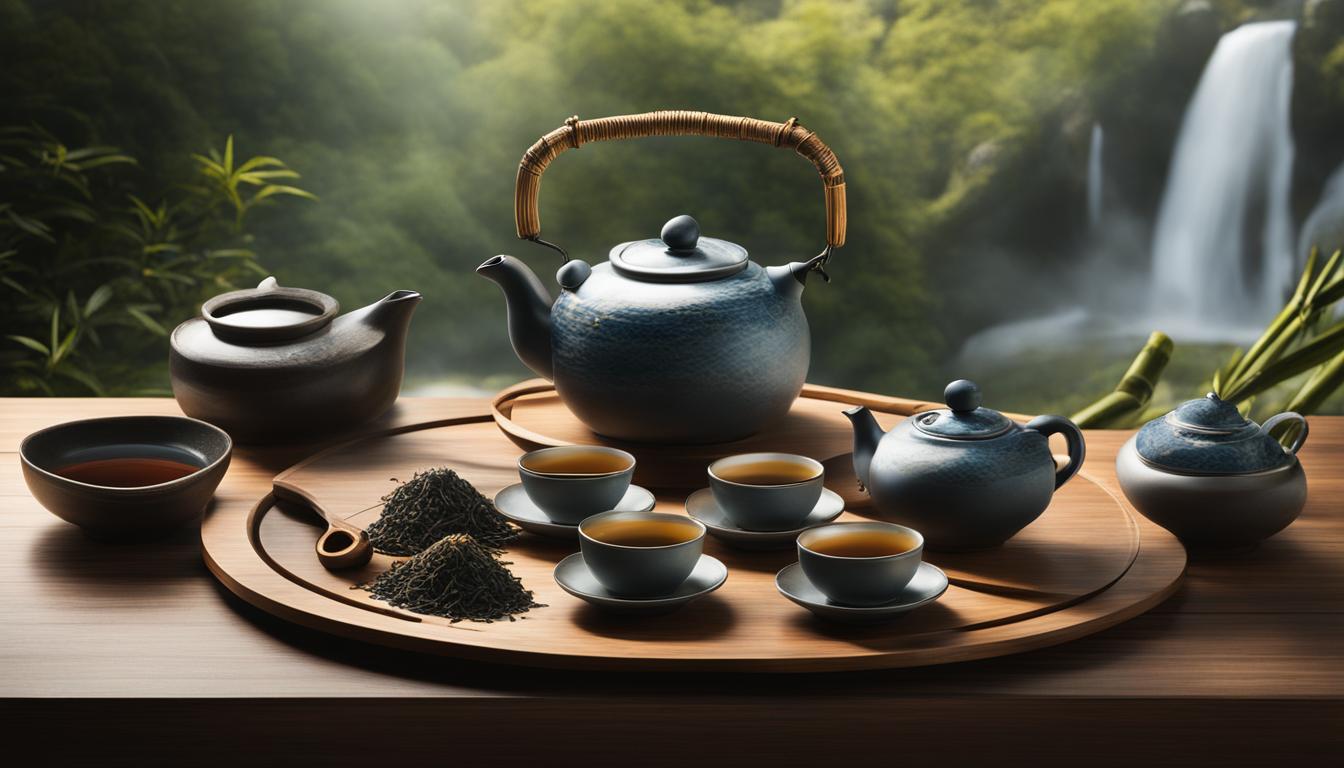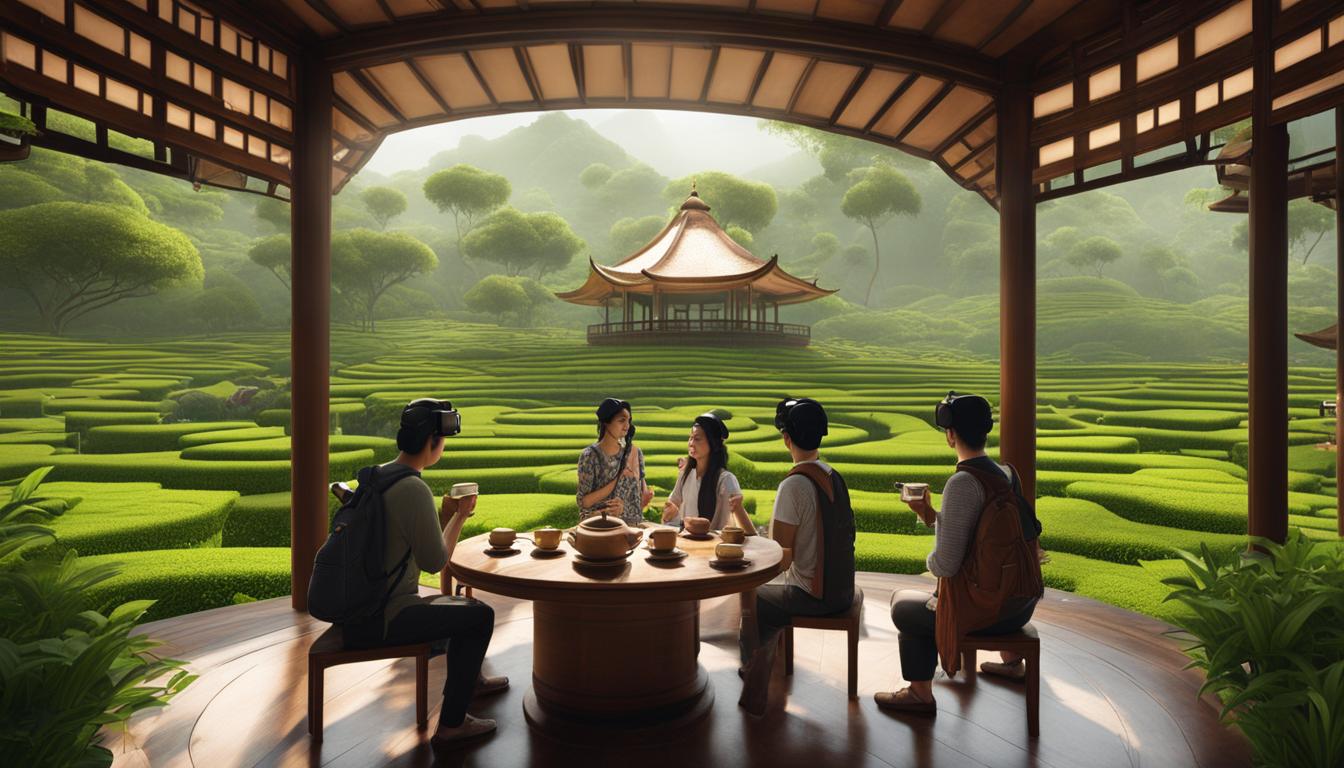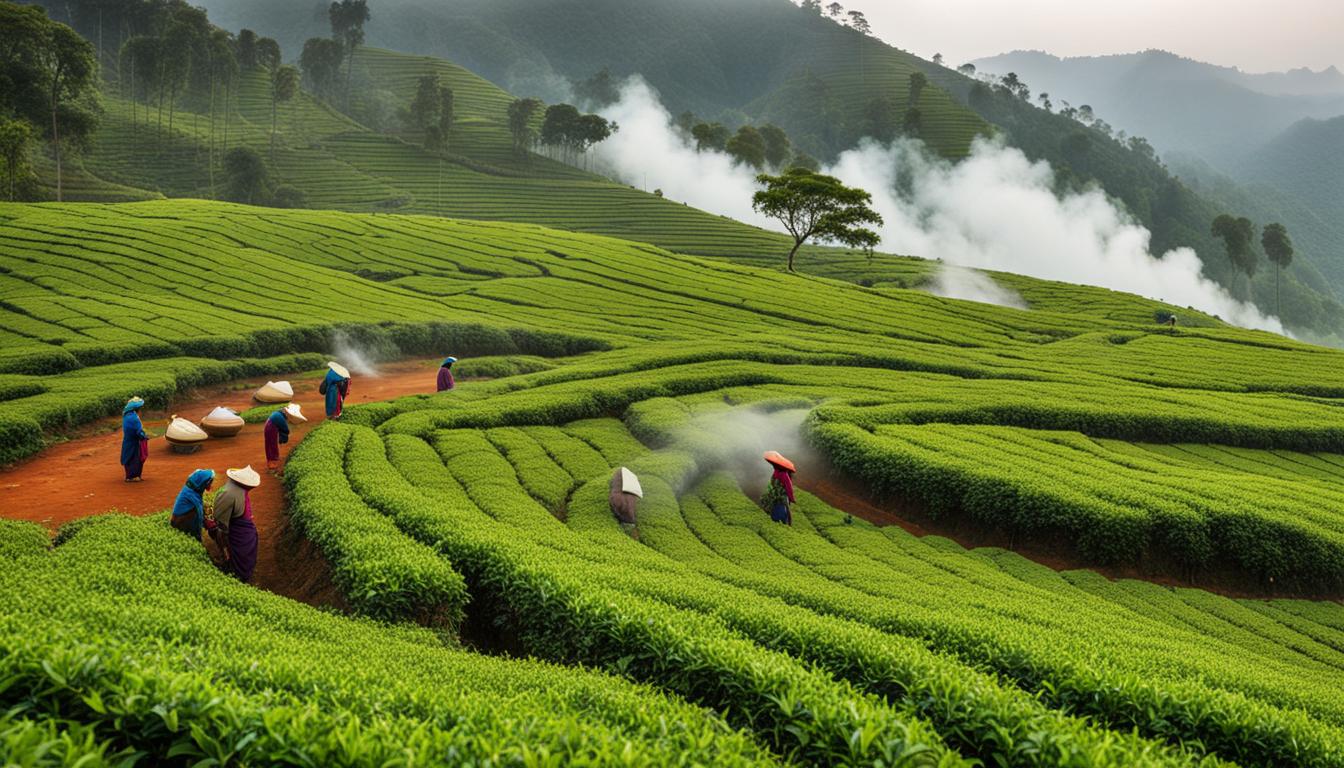Welcome to our exploration of the profound interplay between Taoism and the Chinese Tea Ceremony. In this article, we dive into the fascinating world of tea rituals and how they are influenced by the ancient Chinese philosophy of Taoism. Prepare to embark on a journey of harmony, balance, and tranquility as we uncover the deep connections between Taoist principles and the art of tea appreciation.
Key Takeaways:
- The Chinese Tea Ceremony is deeply rooted in Taoist philosophy, emphasizing harmony, balance, and tranquility.
- Taoist principles such as emptying the mind and acting with natural harmony are embedded in the tea ceremony practices.
- The tea ceremony rituals symbolize the interconnectedness of the universe and foster a deeper understanding of oneself and nature.
- Through tea meditation and immersion in the rituals, participants cultivate mindfulness, tranquility, and a sense of unity.
- The Chinese Tea Ceremony serves as a testament to the enduring influence of Taoism in Chinese culture and the art of tea appreciation.
The Influence of Taoism in Tea Ceremony Rituals
The Chinese Tea Ceremony is a ritualistic practice that integrates Taoist principles, symbolizing the interconnectedness of the universe and the harmony between the human and natural worlds. The preparation and serving of tea in the ceremony require attention to detail, such as water quality, water temperature, tea quality, and teaware. These elements not only facilitate a harmonious and balanced tea experience but also embody the principles of Taoism.
The use of specific teaware represents the interconnectedness and unity of all things. Each piece of teaware, meticulously crafted and carefully chosen, holds symbolic significance, enhancing the overall tea ceremony experience. The structured process of the tea ceremony allows participants to engage in a meditative state, emptying their minds of distractions and embracing the concept of natural harmony, known as Zi Ran (自然) in Taoism.
Through the rituals of the tea ceremony, individuals can cultivate mindfulness, tranquility, and a deeper connection with themselves, nature, and the universe. The act of preparing and serving tea becomes a metaphor for the alchemy and transformation of nature, reflecting the philosophical teachings of Taoism. The tea ceremony encourages participants to let go of external distractions and find peace and serenity in the present moment, embodying the essence of Taoist principles in tea rituals.
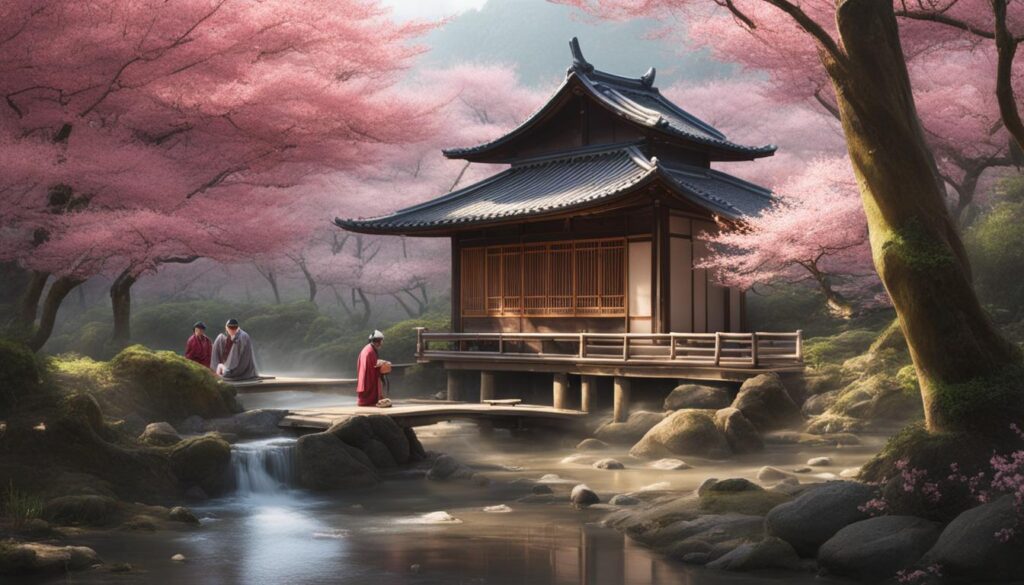
Taoist Principles in Tea Ceremonies
Incorporating Taoist principles in tea ceremonies allows individuals to experience the harmonious interplay of philosophy and practice. By embracing the symbolism and philosophy of Taoism, participants can deepen their understanding of the interconnectedness of all things and find spiritual fulfillment through the art of tea appreciation. The tea ceremony becomes a vessel for integrating Taoism into daily practices, fostering a sense of unity, mindfulness, and tranquility.
Taoist Symbolism in Tea Ceremonies
The Chinese Tea Ceremony is steeped in symbolism, reflecting the philosophical teachings of Taoism. The use of specific teaware and the meticulous preparation and serving of tea symbolize the harmony, balance, and interconnectedness of the universe. Each ritualistic step becomes a representation of the alchemical transformation of nature, allowing participants to immerse themselves in a meditative state and embrace the natural harmony that Taoism signifies.
Taoist Concepts in Tea Rituals
The concepts of natural harmony, mindfulness, and tranquility are deeply embedded in the tea rituals of Taoism. The tea ceremony serves as a means of cultivating these concepts in individuals, encouraging them to let go of external distractions and find inner peace. Through the act of preparing, serving, and appreciating tea, participants can connect with their inner selves and the present moment, gaining a deeper understanding of Taoist teachings and their practical application in daily life.
Integrating Taoism in Chinese Tea Ceremony Practices
The Chinese Tea Ceremony is not just a simple act of serving and drinking tea; it is a profound practice that integrates the principles of Taoism. By embracing Taoist teachings, the ceremony becomes a vehicle for cultivating mindfulness, tranquility, and spiritual awareness. Through the ritualistic preparation and contemplative consumption of tea, participants are encouraged to let go of external distractions and connect with their inner selves and the present moment.
The meditative nature of the tea ceremony allows individuals to experience the essence of Taoist meditation. Just as Taoism emphasizes harmonizing with the natural flow of life, the tea ceremony encourages participants to be fully present and engage in the act of tea preparation and consumption. By immersing themselves in the moment, participants can achieve a sense of inner peace and unity with the universe.
In the Chinese Tea Ceremony, the tea itself becomes a metaphor for the Taoist concept of Qi, the vital energy that flows through all things. The act of brewing and enjoying tea is a way to connect with this energy and nourish both the body and spirit. By incorporating Taoist teachings into the tea ceremony, individuals can deepen their understanding of themselves and develop a greater appreciation for the interconnectedness of all things.
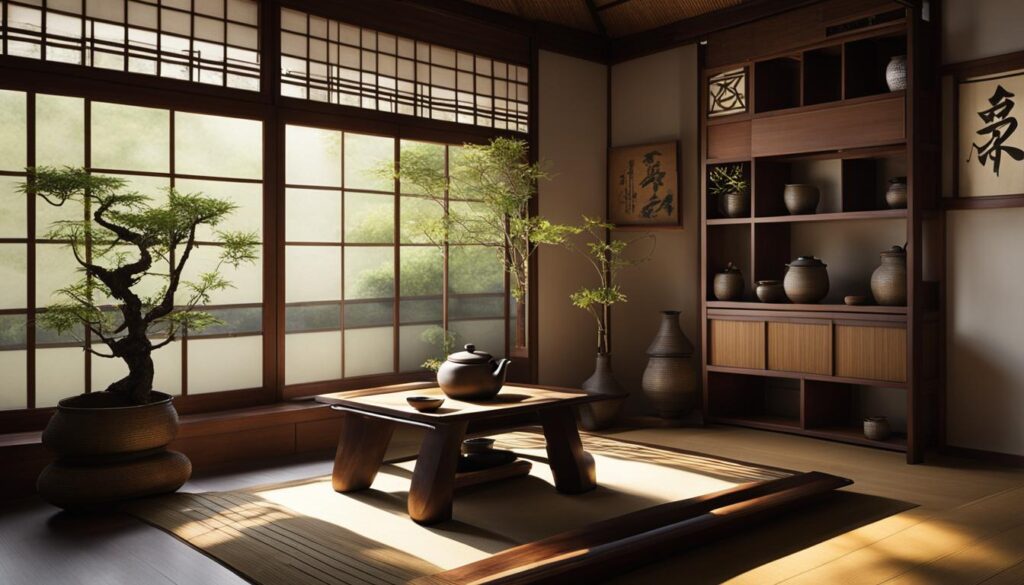
Throughout the ceremony, participants follow a structured set of rituals that symbolize the principles of Taoism. This includes the careful selection of teas, the precise measurement of water, and the use of specific teaware. These rituals not only enhance the sensory experience of tea drinking but also serve as a reminder of the harmony between humans and nature, as well as the constantly changing nature of the universe.
By integrating Taoism into Chinese Tea Ceremony practices, individuals can embark on a journey of self-discovery, inner peace, and a deeper connection with the world around them. The ceremony becomes a means of immersing oneself in the present moment and embracing the wisdom of Taoist teachings. As participants engage in the act of tea meditation, they gain a deeper understanding of themselves, the universe, and the interconnectedness of all things.
The Symbolism and Philosophy of Taoism in the Chinese Tea Ceremony
The Chinese Tea Ceremony is a profound celebration of Taoism, representing the interplay between philosophy and practice. It serves as a symbolic journey that allows participants to immerse themselves in the teachings of Taoism while appreciating the beauty and harmony of the natural world. Through the intricate rituals and symbolism of the ceremony, individuals are invited to explore the transformative power of nature and cultivate a deeper connection with themselves and the universe.
One of the key philosophical aspects of Taoism that is reflected in the tea ceremony is the concept of the Five Elements. In Taoism, the Five Elements (wood, fire, earth, metal, and water) represent the constant transformation and interconnectedness of the universe. In the tea ceremony, these elements are symbolically represented through the tea itself, the water used for brewing, the teaware, the environment in which the ceremony takes place, and the actions and intentions of the participants. Each element contributes to the harmonious and balanced experience of the ceremony, reminding participants of the fundamental principles of Taoism.
Another significant aspect of Taoism that is integrated into the Chinese Tea Ceremony is the emphasis on letting go of external distractions and finding peace and serenity in the present moment. The ritualistic preparation and serving of tea allow participants to engage in a meditative state, emptying their minds of worries and distractions. This practice aligns with the Taoist concept of Wu Wei, which encourages individuals to live in harmony with nature and act in accordance with the natural flow of life. By embracing this philosophy, participants can experience a deep sense of tranquility and mindfulness during the tea ceremony.
The Interconnectedness of Taoism and the Chinese Tea Ceremony
The Chinese Tea Ceremony serves as a testament to the profound influence of Taoism on Chinese culture and the art of tea appreciation. It is a practice that not only nurtures the body but also nourishes the soul, allowing individuals to reflect on their place in the greater cosmic order. Through the symbolism, rituals, and philosophy embedded within the ceremony, participants can explore the core principles of Taoism and cultivate a deeper understanding of themselves and the world.
| Taoist Concepts | Chinese Tea Ceremony Practices |
|---|---|
| Zi Ran (自然) – Natural Harmony | The structured process of the tea ceremony allows participants to achieve a state of natural harmony, emptying their minds and immersing themselves in the present moment. |
| Wu Wei (无为) – Action Through Inaction | Participants are encouraged to act in accordance with the natural flow of the ceremony, allowing the tea to guide their movements and actions. |
| Yin and Yang | The complementary nature of yin and yang is reflected in the tea ceremony, with the contrasting elements of heat and coolness, strength and gentleness, and movement and stillness. |
| The Five Elements | The tea, water, teaware, and the environment in which the ceremony takes place symbolize the interconnectedness and constant transformation of the universe. |
The integration of Taoist philosophy in the Chinese Tea Ceremony offers participants a unique opportunity to experience harmony, balance, and spiritual fulfillment. It is a ceremony that goes beyond the mere act of drinking tea, inviting individuals to connect with themselves, nature, and the deeper universal truths of Taoism.
Conclusion
The interplay between Taoism and the Chinese Tea Ceremony is truly fascinating. Throughout this article, we have explored the deep philosophical and spiritual aspects of the ceremony, shedding light on its profound influence.
By engaging in the practice of tea meditation and immersing ourselves in the rituals, we can unlock a world of mindfulness, tranquility, and profound connection. The Taoist teachings woven into the fabric of the tea ceremony guide us on a path of harmony, balance, and unity.
Through the art of tea appreciation, we can experience a sense of peace and spiritual fulfillment. The Chinese Tea Ceremony is a testament to the enduring presence of Taoism in Chinese culture and its transformational power.
So, let us embrace the Taoist tea ceremony meditation and teachings in Chinese Tea Ceremonies, and allow ourselves to be transported into a world of serenity and self-discovery. Cheers to the intermingling of Taoism and the Chinese Tea Ceremony!
FAQ
What is the significance of Taoism in the Chinese Tea Ceremony?
Taoism plays a significant role in the Chinese Tea Ceremony as it emphasizes harmony, balance, and tranquility, which are experienced through this art and appreciation. The principles of Taoism, such as emptying the mind and acting with natural harmony, are embedded in the tea ceremony practices.
How does the Chinese Tea Ceremony integrate Taoist principles?
The Chinese Tea Ceremony incorporates Taoist principles through meticulous attention to details like water quality, tea quality, water temperature, and teaware. These elements not only contribute to a harmonious and balanced tea experience but also symbolize the principles of Taoism, showcasing the interconnectedness of the universe and the harmony between humans and nature.
How does the Chinese Tea Ceremony help in cultivating mindfulness and tranquility?
By following the structured rituals of the tea ceremony, participants can cultivate mindfulness, tranquility, and spiritual awareness. The meditative nature of the ceremony allows individuals to connect with their inner selves and the present moment by letting go of external distractions and immersing themselves in the tea-serving process.
What does the symbolism in the Chinese Tea Ceremony represent?
The symbolism in the Chinese Tea Ceremony reflects the philosophical teachings of Taoism. It represents the appreciation of beauty, harmony, and the natural world. Additionally, the integration of the Five Elements in the ceremony signifies the interconnectedness and constant transformation of the universe. The act of preparing and serving tea becomes a metaphor for the alchemy and transformation of nature.
How does the interplay of Taoism and the Chinese Tea Ceremony enhance spiritual fulfillment?
The interplay of Taoism and the Chinese Tea Ceremony allows individuals to experience a profound sense of peace and spiritual fulfillment. By embracing the principles of Taoism during the tea ceremony, participants can deepen their understanding of themselves, nature, and the universe, ultimately leading to a sense of harmony, balance, and unity.

